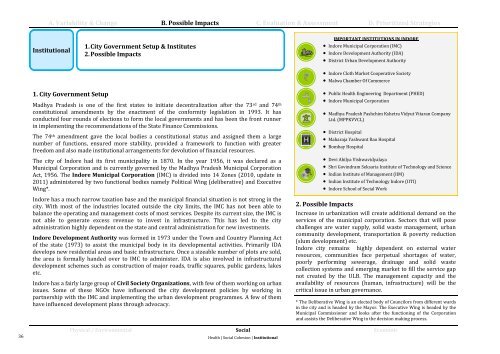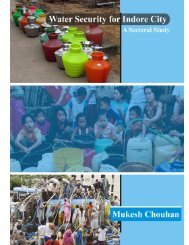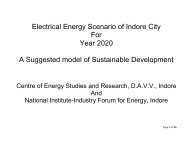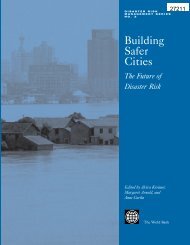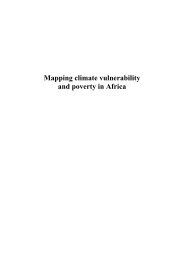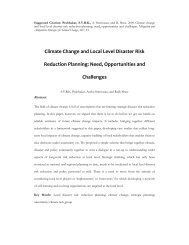Indore City Resilience Strategy - ImagineIndore.org
Indore City Resilience Strategy - ImagineIndore.org
Indore City Resilience Strategy - ImagineIndore.org
You also want an ePaper? Increase the reach of your titles
YUMPU automatically turns print PDFs into web optimized ePapers that Google loves.
A. Variability & Change B. Possible Impacts C. Evaluation & Assessment D. Prioritized Strategies<br />
Institutional<br />
1. <strong>City</strong> Government Setup & Institutes<br />
2. Possible Impacts<br />
IMPORTANT INSTITUTIONS IN INDORE<br />
<strong>Indore</strong> Municipal Corporation (IMC)<br />
<strong>Indore</strong> Development Authority (IDA)<br />
District Urban Development Authority<br />
<strong>Indore</strong> Cloth Market Cooperative Society<br />
Malwa Chamber Of Commerce<br />
1. <strong>City</strong> Government Setup<br />
Madhya Pradesh is one of the first states to initiate decentralization after the 73 rd and 74 th<br />
constitutional amendments by the enactment of the conformity legislation in 1993. It has<br />
conducted four rounds of elections to form the local governments and has been the front runner<br />
in implementing the recommendations of the State Finance Commissions.<br />
The 74 th amendment gave the local bodies a constitutional status and assigned them a large<br />
number of functions, ensured more stability, provided a framework to function with greater<br />
freedom and also made institutional arrangements for devolution of financial resources.<br />
The city of <strong>Indore</strong> had its first municipality in 1870. In the year 1956, it was declared as a<br />
Municipal Corporation and is currently governed by the Madhya Pradesh Municipal Corporation<br />
Act, 1956. The <strong>Indore</strong> Municipal Corporation (IMC) is divided into 14 Zones (2010, update in<br />
2011) administered by two functional bodies namely Political Wing (deliberative) and Executive<br />
Wing*.<br />
<strong>Indore</strong> has a much narrow taxation base and the municipal financial situation is not strong in the<br />
city. With most of the industries located outside the city limits, the IMC has not been able to<br />
balance the operating and management costs of most services. Despite its current size, the IMC is<br />
not able to generate excess revenue to invest in infrastructure. This has led to the city<br />
administration highly dependent on the state and central administration for new investments.<br />
<strong>Indore</strong> Development Authority was formed in 1973 under the Town and Country Planning Act<br />
of the state (1973) to assist the municipal body in its developmental activities. Primarily IDA<br />
develops new residential areas and basic infrastructure. Once a sizeable number of plots are sold,<br />
the area is formally handed over to IMC to administer. IDA is also involved in infrastructural<br />
development schemes such as construction of major roads, traffic squares, public gardens, lakes<br />
etc.<br />
<strong>Indore</strong> has a fairly large group of Civil Society Organizations, with few of them working on urban<br />
issues. Some of these NGOs have influenced the city development policies by working in<br />
partnership with the IMC and implementing the urban development programmes. A few of them<br />
have influenced development plans through advocacy.<br />
Public Health Engineering Department (PHED)<br />
<strong>Indore</strong> Municipal Corporation<br />
Madhya Pradesh Pashchim Kshetra Vidyut Vitaran Company<br />
Ltd. (MPPKVVCL)<br />
District Hospital<br />
Maharaja Yashwant Rao Hospital<br />
Bombay Hospital<br />
Devi Ahilya Vishwavidyalaya<br />
Shri Govindram Seksaria Institute of Technology and Science<br />
Indian Institute of Management (IIM)<br />
Indian Institute of Technology <strong>Indore</strong> (IITI)<br />
<strong>Indore</strong> School of Social Work<br />
2. Possible Impacts<br />
Increase in urbanization will create additional demand on the<br />
services of the municipal corporation. Sectors that will pose<br />
challenges are water supply, solid waste management, urban<br />
community development, transportation & poverty reduction<br />
(slum development) etc.<br />
<strong>Indore</strong> city remains highly dependent on external water<br />
resources, communities face perpetual shortages of water,<br />
poorly performing sewerage, drainage and solid waste<br />
collection systems and emerging market to fill the service gap<br />
not created by the ULB. The management capacity and the<br />
availability of resources (human, infrastructure) will be the<br />
critical issue in urban governance.<br />
* The Deliberative Wing is an elected body of Councilors from different wards<br />
in the city and is headed by the Mayor. The Executive Wing is headed by the<br />
Municipal Commissioner and looks after the functioning of the Corporation<br />
and assists the Deliberative Wing in the decision making process.<br />
36<br />
Physical / Environmental Social Economic<br />
Health | Social Cohesion | Institutional


